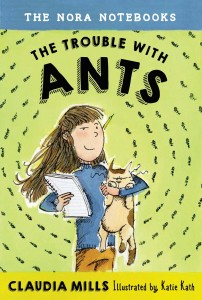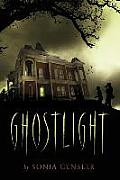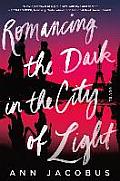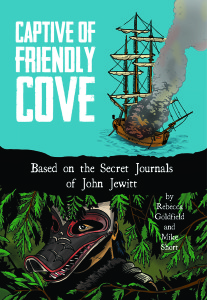Today I’m taking part in a blog tour for Ghostlight, a delightfully creepy book for readers aged 8 to 13. As part of the tour, I am able to give away one copy of the book to a reader with a U.S. address. To enter, leave a comment here before midnight (PDT), October 19, and tell us what you like about creepy stories.
Author Sonia Gensler offers some insights here about her writing and her book. Here’s a bit of information about Gensler: She is also the author of the young adult novels The Dark Between and The Revenant. She grew up in a small Tennessee town and spent her early adulthood collecting impractical degrees from various Midwestern universities. A former high school English teacher, she now writes full-time in Oklahoma. To learn more, and to download a free curriculum guide, visit soniagensler.com. Find her on Twitter: @soniagensler. You may also be interested in the book trailer. Now, here’s the interview.
Sonia Gensler

Sonia Gensler photo by Eden Wilson Photography
Tell us a little bit about what you like about being a writer.
SG Stories in all their forms enrich my life almost as much—and sometimes more than—human relationships. (Perhaps this explains why so many writers are introverts?) It truly is a thrill for me to have a career in telling stories. And as a former teacher, I grab any opportunity to talk about stories with readers and writers, especially young ones.
What do you find the most challenging?
SG Writing can be lonely sometimes. I love being alone, but I still have moments where I feel like an outcast from society, especially when I’ve had too many days at home staring at the computer screen without ever changing out of my pj’s.
Writing can also be hard on one’s feelings. My stories are the children of my imagination, and I flinch a bit when people criticize them. I know a story that appeals to everyone is a rare or even impossible thing, but I still want people to like my story babies!
Ghostlight can be pretty creepy. Was it difficult to write a book that involves the supernatural and yet keep it from being too frightening for young readers?
SG I have always preferred ghost stories that were more mystery than horror. I like to be spooked, but usually I don’t enjoy scenes of violence, gore, or intense terror. Stories with strong, likable characters captivate me, and in those stories the tension involves fear and dread for the characters’ safety more often than physical terror in reaction to plot events. I believe this preference lends itself well to spooky fiction for younger readers.
What kind of research on ghosts and troubled spirits did you do before you wrote Ghostlight?
SG I wrote two ghostly mysteries for young adults before Ghostlight, so I’d already spent several years researching ghosts and the paranormal. This research involved reading both fiction and nonfiction, plus films and documentaries. I really can’t get enough of ghosts! For Ghostlight in particular I did some research on local history in middle Tennessee (the setting) and I also spent the night in Lylewood Inn, the inspiration for Hilliard House. Apparently Lylewood Inn is haunted, but the spirit is benign. I certainly didn’t have any horrifying experiences while I was there!
There’s also a bit about filming home movies in the book. Why do you think making videos can be good projects for kids?
SG It’s a visual form of storytelling, of course, and highly interactive, both of which make it appealing to kids. These days film production is much more accessible because kids have so many options with everyday technology. They can film and edit their projects with phones and tablets, or use a camera (even the most basic of which seems to have a video function) and a computer. If they don’t have access to this technology at home, they may find what they need at school or at the public library.
In many cases, making a film seems a little more exciting to young people than simply writing a story. But they are still using the elements of storytelling—plot, character, theme, symbolism, pacing, etc.
Avery May learns a lot about herself and the people around her during the summer when she’s 12. Is that an age that may be more difficult to navigate than others?
SG I do think this is a difficult time, particularly because of the “tween-ness” of being in that gray zone between a childhood and teenage identity. At that age you still enjoy some of the playful childhood activities, particularly those involving the imagination, but at the same time you are looking ahead to being a more grown up and sophisticated teenager. I remember it being a tough time, but I was lucky to have friends who still liked to “play” even as we were maturing in other ways.
Is there anything else you’d like to add for readers at Mother Daughter Book Club. com?
SG I love the idea of mother-daughter book clubs, and I think Ghostlight is a great option because at its center is a complicated but loving relationship between Avery and her mother, Maddie (who also happens to have a complicated relationship with her mother!).
 Nora Alpers likes making observations and collecting facts, particularly about the ants in her ant farm. As a budding scientist, she knows that facts can be used to draw logical conclusions. Nora is happy to help her friends take care of their dog or watch her classmate’s cat videos, but she’d really like to get more people interested in ants.
Nora Alpers likes making observations and collecting facts, particularly about the ants in her ant farm. As a budding scientist, she knows that facts can be used to draw logical conclusions. Nora is happy to help her friends take care of their dog or watch her classmate’s cat videos, but she’d really like to get more people interested in ants.








